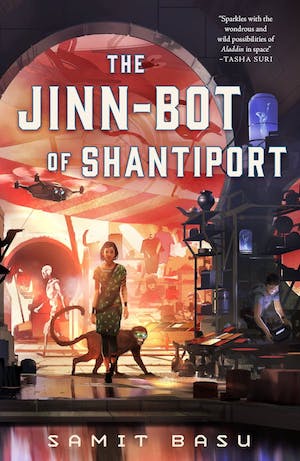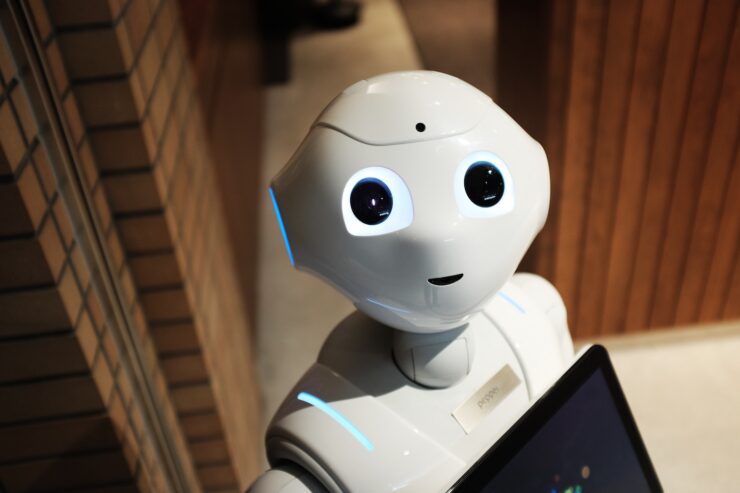In terms of humankind’s relationship with AI and robots, history can broadly be divided into three phases:
- AI and robots! What a cool and slightly scary far-future science fiction concept! Mythical automatons! Daneel! R2D2! Amazing!
- Hmm…
- Ah, crap.
Now we’re firmly into the second phase, where techbros and dysfunctional regimes are happily planning to replace huge chunks of humanity with sinister clunky robots and incompetent AI. And guess what, no one’s bothered to arrange the post-capitalist utopia where humans live lives of pleasure and leisure while machines do all the boring work.
For writers and artists, the threat of the industries we work in being thrown into (deeper) chaos because some corporate person decides to cost-cut/IP-hoard/Replace Annoying Humans is already very real. Which is why it was interesting for me, over the last few years, to on the one hand become increasingly irritated by the advance of the AI takeover, turn down various projects where tech people wanted me to help train AI to replace human authors—and on the other hand, keep working on a novel where two of the three main characters were robots, and also people whose feelings, rights and welfare I cared deeply about because I loved them. Which brought me to the question—why do we still love robots/AI in fiction when we increasingly don’t in real life?
The most obvious one is that storytellers turn robots and AI characters into people. The best robots or AI in fiction are just people, physically different but with feelings and goals that we can understand, if not share. Martha Wells’ Murderbot is a multi-dimensional example of this. Murderbot’s infinite heart, endearing social anxiety, hypercompetence/incompetence mix and relatable pop culture addiction, yes to all, but it works well for less human characters too: Bender Rodriguez’s charismatic megalomania, Marvin the Paranoid Android’s bleak humour, even Roy Batty’s capacity for moist introspective dialogue. There’s a tabula rasa aspect to robots/AI—especially if they didn’t choose their bodies, and their flaws are a result of flawed human programming—that actually makes them easier to like or connect to than human characters, where there’s any number of conscious or unconscious identity-based biases that make humans ‘not relatable.’ A bit like how conlangs can be more appealing than foreign languages.
This also feeds into another aspect of easy empathy-bait—there’s an aspect of innocence and purity to robots. You can see them as children, whether human or animal. We actively want to project loyalty, compassion and courage into them, and that’s how Wall-E trundles into our hearts. And on the less cute front, this allows robots to break our hearts with their capacity for love and sacrifice (The Iron Giant) or for character redemption arcs via reboot (HAL) or rewrite (T-800).
Empathy is boosted by another convenient power fiction brings to the table—distance. Not just the distance generated by the portal of fiction itself, but through the sheer scale of distance that science fiction worldbuilding allows. Space Adventurer and Other-world-saving Murderbot is a far more loveable idea than Actual Rival Job Candidate Murderbot. I cannot imagine how frustrating it would be to go on a quest with high personal stakes sidekicked by R2-D2 bleep-blooping, falling over and concealing vital plot points until several decades later. The more clearly distant the setting of the robot/AI’s story, the more the whole world immerses me in functioning fictional devices—logic-based events! Causality! Consequences!—and the easier it is to attribute personhood to artificial beings.
Speaking of artificiality, another robot-love stimulant is giving them fleshy bits and making them cyborgs, because there’s something about organic parts that renders artificial lifeforms less creepy and alien. Maybe it’s the idea that they experience physicality—pain and pleasure—the same way we do, or generate thoughts and emotions using similar processes. Maybe it’s that in the real world, we’re already in a place where technology has fundamentally changed the way we use our minds and bodies, how we conduct our relationships, what we remember and feel. As everyday technology moves from our devices to our skins and then inside our bodies, and as both physical and mental tech augments become more and more commonplace, cyborgs become less and less alien. Even beyond the individual level, we’re already living in a world where a key objective of the algorithm age is mass surveillance, analysis and control, and we’re already seeing the effect of this on democracies and societies around the world. We may not have cyborgs’ enhanced abilities, but I think we share more of their anxieties than ever before—and the difficulties they face in stories, often thanks to the same exploitative corporations or social bigotry that humans face. All of which makes it easy to cheer for them as they power towards revolutions beyond human reach.
Why else do we love robots or AI? A good part of it—at least up to now—is simply that they’re cool. Cool not just because they’re just like us, but because they’re not like us at all. Whether it’s kawaii robots simply made less sinister by audiovisual cuteness despite their dangerous insides (Baymax!), or big chunky robots that are cool like dinosaurs are cool, spectacular and awe-inspiring from a safe distance.
In real life, companion/toy/household utility robots certainly benefit from cute design, but do we still feel empathy for robots whose functions are scarier, or more overtly and unnecessarily human-substituting? How do you feel about cute police bots, or friendly delivery drones, or even the idea of a handsome giant robot walking through your city? If you think about how much resistance and hostility human doctors still face on the basis of age or identity, how are patients going to feel about multi-armed robot surgeons?
In fiction, though, the cool robot/AI still works, however it’s played—they could be cool even though you want them destroyed, like the dinosaurs in Jurassic Park, or cool because you’re rooting for them to win, like the dinosaurs in the Jurassic Park sequels. Cool because of skilled storytellers who make their alienness fascinating and sympathetic, like Ann Leckie’s ex-mindship Breq, or Becky Chambers’ forest-dwelling evolved sentient human-avoiding robots. We love them for their infinite possibility even though we know they might evolve past us and simply not need us around one day (conveniently long after we’re dead). And so in stories we make them love us. We soothe ourselves by picturing The Next Generation’s Data as a being that is desperate to be human without asking ourselves why he’d want to do that at all in a universe where interesting aliens exist and humans are obsolete. And in the real world, we code AI and robots with all our flaws, ensuring that they’ll actually need to overcome their programming to peacefully coexist with our descendants one day—while we actively resist them throughout this process.
As a writer, it’s fascinating to see how characters I create are seen on the other side of the planet, and part of the temptation of creating robot protagonists was wondering how they’d be seen alongside human ones. While the response to The Jinn-Bot of Shantiport will answer these questions for me personally, the question of whether we can all still love fictional robots and AI as much as we have so far is obviously a much larger one. My guess, though, is that we’ll probably love the idea of robots for very long. Hopefully, before that stops, we’ll have trained real robots to love us back.
Buy the Book


The Jinn Bot of Shantiport
Samit Basu is an Indian novelist. His previous novel, The City Inside, was named one of the best sci-fi/fantasy novels of 2022 by The Washington Post and Book Riot and was short-listed for the JCB Prize. He’s published several novels in a range of speculative genres, all critically acclaimed and bestselling in India, beginning with The Simoqin Prophecies (2003). He also works as a director-screenwriter, a comics writer, and a columnist. He lives in Delhi, Kolkata, and on the internet.










